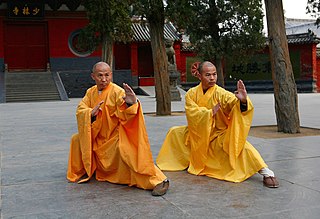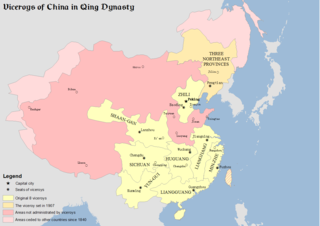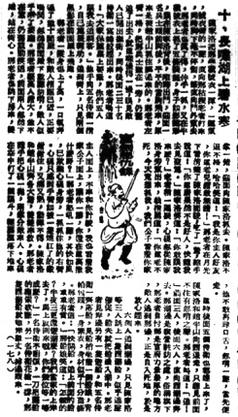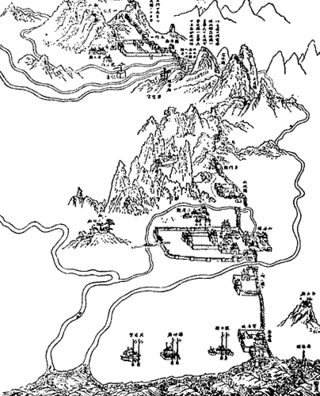
Wuxia,which literally means "martial heroes",is a genre of Chinese fiction concerning the adventures of martial artists in ancient China. Although wuxia is traditionally a form of historical fantasy literature,its popularity has caused it to be adapted for such diverse art forms as Chinese opera,manhua,television dramas,films,and video games. It forms part of popular culture in many Chinese-speaking communities around the world.

Li Zicheng,born Li Hongji,also known by the nickname,Dashing King,was a Chinese peasant rebel leader who overthrew the Ming dynasty in 1644 and ruled over northern China briefly as the emperor of the short-lived Shun dynasty before his death a year later.
The Chongzhen Emperor,personal name Zhu Youjian,courtesy name Deyue (德約),was the 17th and last Emperor of the Ming dynasty. He reigned from 1627 to 1644. "Chongzhen," the era name of his reign,means "honorable and auspicious."

Zongdu,usually translated as Viceroy,Head of State or Governor-General,governed one territory or more provinces of China during the Ming and Qing dynasties.
The Ming Cult is a fictional cult and martial arts school featured in the wuxia novel The Heaven Sword and Dragon Saber by Jin Yong,first published in serial form from 1961 to 1963. It is also briefly mentioned in The Legend of the Condor Heroes,another novel also by Jin Yong. It is loosely based on Manichaeism,an actual gnostic religion which originated in Persia in the 3rd century CE and later spread to other parts of the world,including China. The cult's headquarters is at Bright Peak in the Kunlun Mountains and it has several other bases spread throughout China. Its most powerful skills are the "Heaven and Earth Great Shift" and the "Martial Arts of the Holy Flame Tablets".

The Book and the Sword is a wuxia novel by Jin Yong. First serialised between 8 February 1955 and 5 September 1956 in the Hong Kong newspaper The New Evening Post,it is also Jin Yong's debut novel.
Zhu Meichuo,known by her title Princess Changping,was a Chinese princess of the Ming dynasty. She was one of the children of the Chongzhen Emperor and Empress Zhou.

Chang Yuchun,courtesy name Boren and art name Yanheng,was a Chinese military general of the Ming dynasty. He was a follower of Zhu Yuanzhang,the founding emperor of the Ming dynasty,and contributed heavily to the establishment of the Ming Empire. He was famous for his bravery and formidable prowess in battle,which earned him the nickname of "Chang Hundred-Thousand" (常十万),because he alone was said to be as effective as a force of 100,000 troops.

Sword Stained with Royal Blood is a 1981 Hong Kong film produced by the Shaw Brothers Studio,directed by Chang Cheh and starring the Venom Mob. The film was based on the novel of the same name by Louis Cha. The film was one of the rarest Venom martial arts film available,and has been digitally remastered and released by Celestial Pictures.

Hong Chengchou,courtesy name Yanyan and art name Hengjiu,was a Chinese official who served under the Ming and Qing dynasties. He was born in present-day Liangshan Village,Yingdu Town,Fujian Province,China. After obtaining the position of a jinshi in the imperial examination in 1616 during the reign of the Wanli Emperor,he joined the civil service of the Ming Empire and served as an official in Shaanxi. During the reign of the Chongzhen Emperor,he was promoted to Minister of War and Viceroy of Suliao. In 1642,he surrendered and defected to the Manchu-led Qing Empire after his defeat at the Battle of Songjin. He became one of the Qing Empire's leading Han Chinese scholar-politicians. While he was in office,he encouraged the Manchu rulers to adopt Han Chinese culture and provided advice to the Qing government on how to consolidate its control over the former territories of the fallen Ming Empire. Apart from Dorgon and Fan Wencheng (范文程),Hong Chengchou was regarded as one of the most influential politicians in the early Qing dynasty. However,he was also villainised by the Han Chinese for his defection to the Qing Empire and for his suppression of the Southern Ming dynasty.

Seven Swordsmen is a 2006 Chinese television series directed by Clarence Fok and produced by Tsui Hark. The series is loosely adapted from Liang Yusheng's wuxia novels Qijian Xia Tianshan and Saiwai Qixia Zhuan. It is also the television series counterpart to the 2005 film Seven Swords,which was also directed and produced by Tsui Hark. This series was originally planned to be the first season of a longer television series but the project seems to have been abandoned.
Baifa MonüZhuan is a wuxia novel by Liang Yusheng first published as a serial between 5 August 1957 and 10 December 1958 in the Hong Kong newspaper Sin Wun Pao. Considered the first part of the Tianshan series of novels by Liang Yusheng,it is closely related to the second and third parts of the series:Saiwai Qixia Zhuan and Qijian Xia Tianshan. The novel has also been loosely adapted into films and television series,such as The Bride with White Hair (1993) and The Romance of the White Hair Maiden (1995),and The White Haired Witch of Lunar Kingdom (2014).
The distinction between Huá and Yí,also known as Sino–barbarian dichotomy,is a historical Chinese concept that differentiated a culturally defined "China" from cultural or ethnic outsiders. Although Yíis often translated as "barbarian",other translations of this term in English include "foreigners","ordinary others" "wild tribes",and "uncivilized tribes". The Hua–Yi distinction asserted Chinese superiority,but implied that outsiders could become Hua by adopting Chinese values and customs. These concepts were not unique to the Chinese,but were also applied by the Vietnamese,Japanese and Koreans who all considered themselves at one point in history to be "Middle Kingdom" (Zhongguo) instead of China.

Royal Tramp is a 2008 Chinese television series adapted from Louis Cha's novel The Deer and the Cauldron. Produced by Zhang Jizhong and Huayi Brothers,the series consists of 50 episodes,filmed in high definition. The series was first broadcast on Jiangsu TV in China in 2008 and was subsequently aired on TVB in Hong Kong and other countries.

Sword Stained with Royal Blood is a 2007 Chinese television series adapted from Louis Cha's novel of the same title. The series was first broadcast on CTV in Taiwan in 2007.

Romance of the White Haired Maiden is a 1999 Taiwanese television series adapted from the wuxia novel Baifa MonüZhuan by Liang Yusheng. Alternative Chinese titles for the series include Yidai Xianü (一代俠女) and Baifa Xianü (白髮俠女).

The Affaire in the Swing Age,also known as The Dynasty or Love Against Kingship,is a 2003 Chinese television series based on the novel Jiangshan Fengyu Qing by Zhu Sujin,who was also the screenwriter for the series. The series depicts the events in the transition of the Ming dynasty to the Qing dynasty in China,focusing on the lives of historical figures such as Li Zicheng,Wu Sangui,Chen Yuanyuan,the Chongzhen Emperor and Huangtaiji.

The transition from Ming to Qing,alternatively known as Ming–Qing transition or the Manchu conquest of China,from 1618 to 1683,saw the transition between two major dynasties in Chinese history. It was a decades-long conflict between the emerging Qing dynasty,the incumbent Ming dynasty,and several smaller factions. It ended with the consolidation of Qing rule,and the fall of the Ming and several other factions.

The Later Jin,officially known as Jin or the Great Jin,was a Jurchen-led royal dynasty of China in Manchuria and the precursor to the Qing dynasty. Established in 1616 by the Jianzhou Jurchen chieftain Nurhaci upon his reunification of the Jurchen tribes,its name was derived from the earlier Jin dynasty founded by the Wanyan clan which had ruled northern China in the 12th and 13th centuries.














